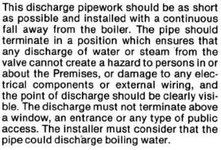You are using an out of date browser. It may not display this or other websites correctly.
You should upgrade or use an alternative browser.
You should upgrade or use an alternative browser.
Remember to pay the Builder.
- Thread starter Wully
- Start date
St3v3
Full Member
- Messages
- 1,820
Christina headed up to a flat we have on Thursday to meet the gas engineer as the boiler had bypassed leaving a black mark on the external wall which a neighbour had picked up on.
In came the lad had a look and said it needs a power flush as the system is clogged up and the bypass valve is shot and the boiler is out of balance ill send you a quote and here is my bill for £49.50 ex vat. I asked her what the ***k is a power flush did you pay him behind the front door? Sent a friend in who used to be corgie registered but let it lapse. Checked the system everything ok the house is less than three years old, turns out Ruaidhri had bled the radiators and the pressure dropped so applied a little too much pressure to the system when adjusting hence the black mark down the wall. £2 bend put on the overflow to keep any future overflow off the wall. Still waiting on the quote and will keep you updated.
It's the pressure relief valve you're talking about by the seems of things, a few points.
If the water coming out of there (or anywhere you drain the system) is black, then a powerflush isn't a bad idea. At least drain, fill with system cleaner, drain again and fill with corrosion inhibitor. If you don't it can lead to rads not working or boiler damage.
If water is coming out of the PRV outlet and the system pressure/expansion vessel are OK, assuming the valve needs replacing isn't unfair, especially if no-one mentioned the bleeding/refilling.
The outlet from the PRV is required to be directed at the wall for safety because it can be scalding hot water venting from there.

"did you pay him behind the front door?" What does that mean? New one on me lol.
St3v3
Full Member
- Messages
- 1,820
How are they explaining the water being black?The house is just over two years old so not in need of a flush. It has just been checked out by a friend of mine this morning who was a registered gas engineer. I first spoke to someone here who i know and both came up with the same answer the guy was a canter.
You'll probably find that it's never had any inhibitor in the system.
Up to you anyway, just another view from someone who isn't trying to make money from you.
Wully
Full Member
- Messages
- 2,989
Labour on that estimate is mental as the part costs £26+vat he’s changing £450+vat for labour. He’s basically bleeding the system and fitting a small filter max 1hour labour. So it looks like he charges £400 an hour. Even if he charges £100 an hour and it takes him 2 hours he’s still wrong. Even with the Edinburgh surcharge as we call it it looks wrong to me.
St3v3
Full Member
- Messages
- 1,820
Labour on that estimate is mental as the part costs £26+vat he’s changing £450+vat for labour. He’s basically bleeding the system and fitting a small filter max 1hour labour. So it looks like he charges £400 an hour. Even if he charges £100 an hour and it takes him 2 hours he’s still wrong. Even with the Edinburgh surcharge as we call it it looks wrong to me.
Powerflush is done by a machine that is around £1500 to buy. You usually remove the pump head and fit an adapter, the machine then forces cleaning chemicals around the system then you drain and refill. Takes a full day, plus the cost of chemicals and overheads. The filter he has quoted to fit I'm assuming is a magnaclean type thing, around £100.
Scotia
Full Member
- Messages
- 1,327
He stated the water was black but when Christina asked to see he had said he poured it down the drain, when Jim checked this morning it is brown which in his words inhibitor has been added from new.How are they explaining the water being black?
You'll probably find that it's never had any inhibitor in the system.
Up to you anyway, just another view from someone who isn't trying to make money from you.
St3v3
Full Member
- Messages
- 1,820
He stated the water was black but when Christina asked to see he had said he poured it down the drain, when Jim checked this morning it is brown which in his words inhibitor has been added from new.
I meant the black on the walls, but anywho, that's enough from me unless any more questions come up.
Scotia
Full Member
- Messages
- 1,327
From new yes, after two years in the system? Maybe staining on the wall would have been a better choice of word. I have not seen it personally only my sons words who lives in the flat.I meant the black on the walls, but anywho, that's enough from me unless any more questions come up.
Inhibitor is clear BTW.
St3v3
Full Member
- Messages
- 1,820
No matter what they have been kicked well into touch!
What might be a good idea is to check in a fortnight or so of use if there has been any leakage from the PRV (evident by needing to top up the pressure more than actually seeing it leak.) Once the PRV has opened they sometimes don't re-seal properly.
You could also tie a balloon on the end of the pipe if you want an easy way to see from outside.
rugbyken
Full Member
- Messages
- 1,623
a 3 bar PRV on a combi is the main safety device it will dump the water causing the boiler to cut out if any blockages overheats etc occur, the combis have a sealed system and even the tiniest seepage will cause the system to loose pressure & cut out unfortunately a lot of customers thinking themselves clever would leave the filling valve open a crack to keep it topped up & this would unseat the PRV and the continuous drip causes staining,
on a 3 year old system there shouldn’t be any electrolysis causing the water to blacken but it really should have a magnaclean on the system a simple device that collects all the sediment that are created by the chemical reaction of all the different metals in the system this is why most boiler manufacturers insist on a flush out before fitting a new boiler even on a brand new system ,
on a relatively new system you shouldn’t need a flush out as steve has said if inhibitor has been added it’s mainly used to clear blocked radiators where the sediment has settled in the fins we used to have a heat camera that would show the hflow coming into the rad running over the top and being drawn out the opposite side but as it flowed over the top the sediment settles in the fins just turning all the rads off & opening each downstairs one in turn is enough to prevent a build up ,
there are 3 types of power flush a simple one is remove a rad isolate the boiler connect hoses to the rad valves & flush through by opening the valves on each rad in turn, a less wasteful way is powerful pump fitted on a reservoir tank recirculates the water through a magnaclean filter again isolating each rad in turn & classing the boiler as the last rad , the even more comprehensive flush involves removing each rad and physically clearing blockages only normally required on an open system, i all cases running a system with an agent added beforehand will help and of course adding inhibitor afterwards will stop it from reoccurring,
a college lecturer explained balancing as “like plumbers waters lazy & will take the path of least resistance” pipe runs bends climbs all cause drag so if a pump is producing 10gallons the first rad in line is wide open say 20% of the flow will take this route second another 20% of remaining flow so after five rads upstairs is weltering downstairs freezing , i had a book full of calculations to work out the resistance to each rad but in reality turn of the rad normally 2,5 turns and open up in 1/4 turn increments all upstairs should be less than 1 full turn this will force the water to flow downstairs
on a 3 year old system there shouldn’t be any electrolysis causing the water to blacken but it really should have a magnaclean on the system a simple device that collects all the sediment that are created by the chemical reaction of all the different metals in the system this is why most boiler manufacturers insist on a flush out before fitting a new boiler even on a brand new system ,
on a relatively new system you shouldn’t need a flush out as steve has said if inhibitor has been added it’s mainly used to clear blocked radiators where the sediment has settled in the fins we used to have a heat camera that would show the hflow coming into the rad running over the top and being drawn out the opposite side but as it flowed over the top the sediment settles in the fins just turning all the rads off & opening each downstairs one in turn is enough to prevent a build up ,
there are 3 types of power flush a simple one is remove a rad isolate the boiler connect hoses to the rad valves & flush through by opening the valves on each rad in turn, a less wasteful way is powerful pump fitted on a reservoir tank recirculates the water through a magnaclean filter again isolating each rad in turn & classing the boiler as the last rad , the even more comprehensive flush involves removing each rad and physically clearing blockages only normally required on an open system, i all cases running a system with an agent added beforehand will help and of course adding inhibitor afterwards will stop it from reoccurring,
a college lecturer explained balancing as “like plumbers waters lazy & will take the path of least resistance” pipe runs bends climbs all cause drag so if a pump is producing 10gallons the first rad in line is wide open say 20% of the flow will take this route second another 20% of remaining flow so after five rads upstairs is weltering downstairs freezing , i had a book full of calculations to work out the resistance to each rad but in reality turn of the rad normally 2,5 turns and open up in 1/4 turn increments all upstairs should be less than 1 full turn this will force the water to flow downstairs
St3v3
Full Member
- Messages
- 1,820
but in reality turn of the rad normally 2,5 turns and open up in 1/4 turn increments all upstairs should be less than 1 full turn this will force the water to flow downstairs
I see so many rads with the lockshield fully open, all of the rads work eventually once the TRV's (If they're not all on full as well
rugbyken
Full Member
- Messages
- 1,623
agree steve we used to get so many jobs people asking for bigger rads or doubles spend a couple of hours opening wheel heads fully adjusting lockshields you could sometimes smell the paint on the rads heating up because they had never got hot before then they would say you haven’t done anything ???, try & convince someone that the only way to get the rest of the system as hot as the bathroom rad was to turn that one down no chance i used to say he’s ate all the pies leaving none for the rest of the house would normally try & get them to promise not to adjust the rads for 24 hrs
andromeda
Full Member
- Messages
- 933
One thing I have learnt is that some builders tend to over quote if the job is too small or too trivial for their expertise. I just wish they would be more honest about not wanting the job. One guy said week after week he would send a quote by a certain day. As he was my second quote I hung on. Then gave up.
Other side of coin: A great plumber who came to quote for the shower room. Absolutely honest in his sorry the job wasnt big enough fir him. He was then working on a rather larger house than mine; it had 6 bathrooms! ( as rec by friend I found that was true)
Other side of coin: A great plumber who came to quote for the shower room. Absolutely honest in his sorry the job wasnt big enough fir him. He was then working on a rather larger house than mine; it had 6 bathrooms! ( as rec by friend I found that was true)
alwaysared
Full Member
- Messages
- 875
I don't understand why a job would be too smallOne thing I have learnt is that some builders tend to over quote if the job is too small or too trivial for their expertise. I just wish they would be more honest about not wanting the job. One guy said week after week he would send a quote by a certain day. As he was my second quote I hung on. Then gave up.
Other side of coin: A great plumber who came to quote for the shower room. Absolutely honest in his sorry the job wasnt big enough fir him. He was then working on a rather larger house than mine; it had 6 bathrooms! ( as rec by friend I found that was true)
Kind regards,
Del
trevskoda
Full Member
- Messages
- 6,347
You fitt rad valves upstairs but not downstairs, ballance the rads by closing down the return valves to about half turn open, use a magnetic filter on return to boiler, fill sys with 25ltrs of antifreeze to stop bursting if it breaks down when away on jollies, and it helps keep it clean, i love fixing heating systems fitted by so called plumbers with sign written vans.a 3 bar PRV on a combi is the main safety device it will dump the water causing the boiler to cut out if any blockages overheats etc occur, the combis have a sealed system and even the tiniest seepage will cause the system to loose pressure & cut out unfortunately a lot of customers thinking themselves clever would leave the filling valve open a crack to keep it topped up & this would unseat the PRV and the continuous drip causes staining,
on a 3 year old system there shouldn’t be any electrolysis causing the water to blacken but it really should have a magnaclean on the system a simple device that collects all the sediment that are created by the chemical reaction of all the different metals in the system this is why most boiler manufacturers insist on a flush out before fitting a new boiler even on a brand new system ,
on a relatively new system you shouldn’t need a flush out as steve has said if inhibitor has been added it’s mainly used to clear blocked radiators where the sediment has settled in the fins we used to have a heat camera that would show the hflow coming into the rad running over the top and being drawn out the opposite side but as it flowed over the top the sediment settles in the fins just turning all the rads off & opening each downstairs one in turn is enough to prevent a build up ,
there are 3 types of power flush a simple one is remove a rad isolate the boiler connect hoses to the rad valves & flush through by opening the valves on each rad in turn, a less wasteful way is powerful pump fitted on a reservoir tank recirculates the water through a magnaclean filter again isolating each rad in turn & classing the boiler as the last rad , the even more comprehensive flush involves removing each rad and physically clearing blockages only normally required on an open system, i all cases running a system with an agent added beforehand will help and of course adding inhibitor afterwards will stop it from reoccurring,
a college lecturer explained balancing as “like plumbers waters lazy & will take the path of least resistance” pipe runs bends climbs all cause drag so if a pump is producing 10gallons the first rad in line is wide open say 20% of the flow will take this route second another 20% of remaining flow so after five rads upstairs is weltering downstairs freezing , i had a book full of calculations to work out the resistance to each rad but in reality turn of the rad normally 2,5 turns and open up in 1/4 turn increments all upstairs should be less than 1 full turn this will force the water to flow downstairs
trevskoda
Full Member
- Messages
- 6,347
You can use little isolation valves for that, good man leaving the heating on when away, many forget this to come home to a flooded house.trev i always fit rad valves simply makes isolating to remove a rad for decoration etc a 5 min job rather than full drain down i leave my heating on constant when away (if only ) jan-mar set to a10deg will not usually come on if we’ll insulated

